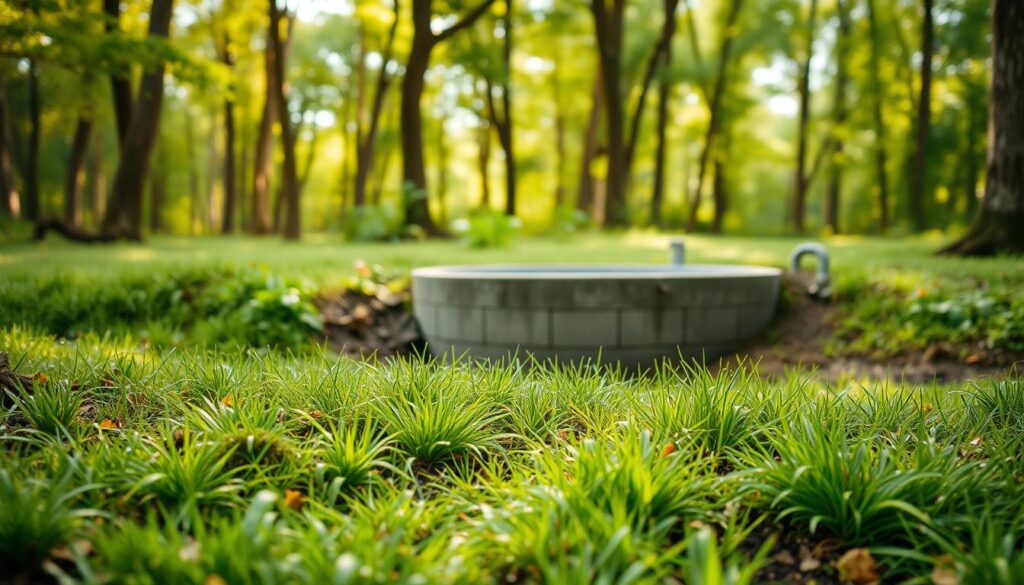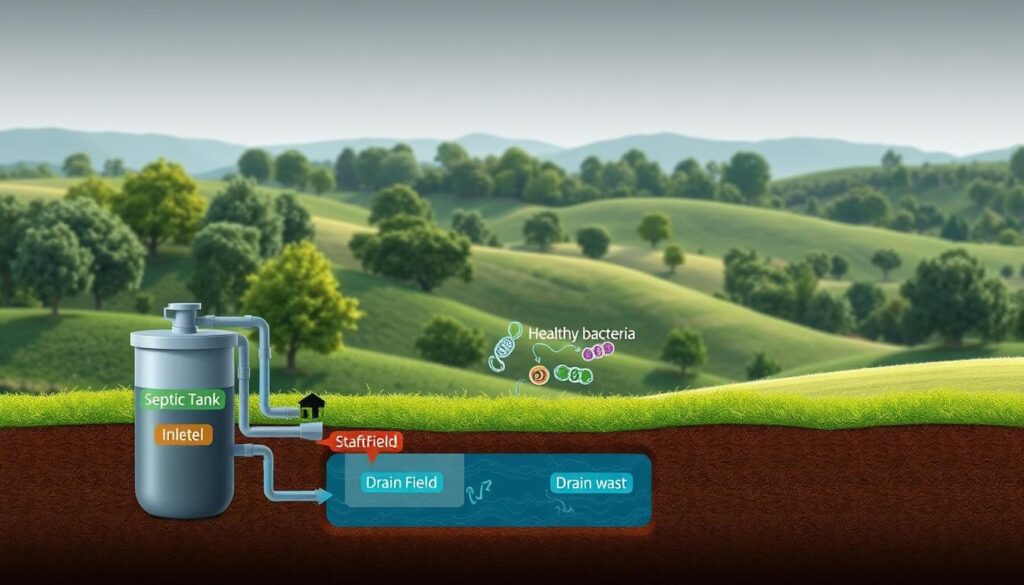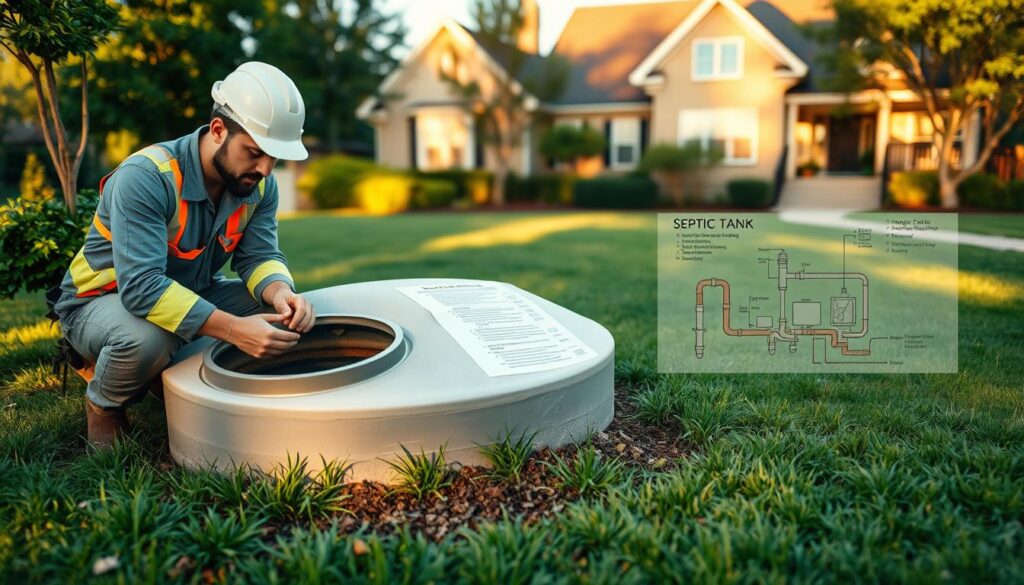Are you unknowingly damaging your septic system with everyday habits? Many homeowners are unaware of the simple actions that can lead to costly repairs or even premature failure of their septic tanks.
According to Advanced Septic Services, understanding the basics of septic tank maintenance is crucial for preventing such issues. Certain daily habits can significantly impact the longevity and efficiency of your septic system.
By being aware of these habits, you can take proactive steps to protect your septic tank and avoid unnecessary expenses.
Key Takeaways
- Identify common household habits that harm septic systems.
- Learn how to maintain your septic tank effectively.
- Understand the importance of regular septic system inspections.
- Discover simple changes to improve your septic system’s longevity.
- Find out how to prevent costly repairs and replacements.
Understanding Your Septic System’s Vulnerability
Understanding the intricacies of your septic system can save you from costly repairs. A septic system is a complex, self-contained wastewater treatment system that requires regular maintenance to function properly.
How Your Septic System Works
A typical septic system consists of a septic tank and a drain field. Wastewater from your home flows into the septic tank, where solid waste settles to the bottom and oil and grease float to the top. The remaining wastewater is released into the drain field, where it is filtered by the soil.
Why Everyday Habits Matter
Everyday habits can significantly impact your septic system’s health. Simple actions, such as being mindful of what you flush down the toilet or pour down the drain, can make a big difference. Following septic system care tips and being aware of septic system dos and don’ts can help prevent system failure.
The Cost of Septic System Failure
The consequences of neglecting your septic system can be severe. System failure can lead to costly repairs, environmental hazards, and even health risks. Regular maintenance is crucial to extending the life of your septic system and avoiding these issues.
10 Household Habits That Could Be Killing Your Septic System
The health of your septic system is closely tied to your daily household habits. Being mindful of what goes down the drain is crucial for maintaining a healthy septic system, as emphasized in Septic Tank Care and Maintenance 101. Certain everyday practices can significantly impact the longevity and efficiency of your septic system. Understanding these habits is the first step towards preserving your system’s health.
The Science Behind Septic System Damage
Septic systems rely on a delicate balance of bacteria to break down waste. Disrupting this balance with non-biodegradable items or harsh chemicals can lead to system failures. It’s essential to understand how your daily habits affect this balance to prevent damage.
Warning Signs of a Struggling System
Recognizing the warning signs of a struggling septic system is crucial for timely intervention. Symptoms like slow drains, sewage backups, or lush patches of grass over the drain field can indicate problems. Being aware of these signs helps in addressing issues before they escalate.
Overview of Preventable Damage
Many common household habits can be adjusted to prevent damage to your septic system. Simple changes, such as being more mindful of what you flush or pour down the drain, can significantly extend the life of your septic system. Adopting septic system best practices is key to avoiding costly repairs and maintaining a healthy system.
Habit #1: Flushing Non-Biodegradable Items
Flushing non-biodegradable items is a surefire way to damage your septic system and incur costly repairs. Your septic system’s health is heavily dependent on what you flush down the toilet.
Common Bathroom Culprits
Items like wipes, feminine products, and dental floss are common culprits that can cause significant harm. Advanced Septic Services advises against flushing “flushable” wipes, as they can cause major damage to septic systems.
How These Items Create Blockages
These non-biodegradable items do not break down and can accumulate in your septic system, leading to blockages and potential system failure. Regularly flushing such items can overwhelm your system.
Septic-Safe Alternatives
To maintain a healthy septic system, consider alternatives like biodegradable wipes and proper disposal methods for feminine products and dental floss. Here are some tips for a septic-safe bathroom routine:
| Item | Septic-Safe Alternative |
|---|---|
| Wipes | Biodegradable wipes or cloths |
| Feminine Products | Menstrual cups or disposal bags |
| Dental Floss | Proper disposal in trash |
By adopting these septic-safe alternatives, you can significantly improve your septic system’s health and longevity, following a good septic system maintenance guide and septic system health tips.
Habit #2: Using Excessive Amounts of Water
One of the most significant threats to a septic system is the excessive use of water in daily household activities. When too much water is introduced into the system, it can overwhelm the drain field, leading to potential failures and costly repairs.
How Water Overload Overwhelms Your Drain Field
Excessive water use can saturate the drain field, reducing its ability to filter and treat wastewater effectively. This can lead to backups, surface breakouts, and contamination of nearby water sources. As Soluo septic solutions emphasizes, conserving water is crucial to preventing such issues.

High-Impact Sources: Laundry, Showers, and Dishwashers
Daily activities like doing laundry, taking long showers, and running dishwashers are significant contributors to water usage. These activities can strain the septic system if not managed properly. For instance, running multiple loads of laundry in a single day can flood the system with more water than it can handle.
Water Conservation Strategies for Septic System Owners
To maintain a healthy septic system, it’s essential to adopt water conservation strategies. Simple measures include fixing leaks, installing low-flow fixtures, and spacing out water-intensive activities. By being mindful of water usage, homeowners can significantly reduce the risk of overwhelming their septic system. As a general rule, “a well-maintained septic system is key to a healthy home and environment.”
Habit #3: Pouring Grease and Oil Down the Drain
One of the most detrimental habits for your septic system is disposing of grease and oil through your drains. When you pour grease down the drain, it may seem harmless at first, but it can cause significant problems as it cools and solidifies within your pipes and septic tank.
The Journey of Grease Through Your Pipes and Tank
Grease and oil travel through your pipes and into your septic tank, where they can cause issues. Initially, they may be in a liquid state, but as they cool, they solidify and separate from the wastewater. This solidified grease can accumulate and cause clogs in your pipes and tank.
How Fats Create Clogs and Prevent Proper Decomposition
The buildup of grease and fats in your septic system can lead to clogs and backups. Moreover, these substances can coat the bacteria in your tank, hindering the decomposition process. This can result in a failing septic system, leading to costly repairs.
Safe Disposal Methods for Cooking Oils and Grease
To avoid these issues, it’s essential to dispose of cooking oils and grease properly. Here are some safe methods:
| Method | Description |
|---|---|
| Cool and Solidify | Let the grease cool and solidify, then dispose of it in the trash. |
| Use a Grease Container | Store grease in a designated container and dispose of it when full. |
| Recycle | Check if your local recycling center accepts cooking oil for recycling. |
By adopting these practices, you can significantly reduce the risk of damaging your septic system. Proper disposal of grease and oil is a crucial septic system care tip to keep in mind.
Habit #4: Overusing Harsh Cleaning Chemicals
Overusing harsh cleaning chemicals is a common household habit that can have detrimental effects on your septic system. According to Advanced Septic Services, using such chemicals can harm the beneficial bacteria in septic systems, leading to system failures.

How Bleach and Antibacterial Products Kill Essential Bacteria
Bleach and antibacterial products are particularly harmful to septic systems because they kill the beneficial bacteria that break down waste. Without these bacteria, your septic system can’t function properly, leading to potential backups and failures.
Most Harmful Household Cleaners to Avoid
Some of the most harmful household cleaners include bleach, antibacterial soaps, and products containing quaternary ammonium compounds (quats). These products can disrupt the balance of your septic system, so it’s best to avoid them or use them sparingly.
Natural, Septic-Safe Cleaning Alternatives
To maintain a healthy septic system, consider switching to natural, septic-safe cleaning alternatives. Products labeled as “septic-safe” or those made from natural ingredients like baking soda and vinegar are good options. By adopting septic system best practices, such as using gentle cleaning products, you can help ensure the longevity of your system and contribute to overall septic system preservation.
Habit #5: Neglecting Regular Maintenance and Pumping
Neglecting regular maintenance and pumping is a critical habit that can severely impact your septic system’s longevity. According to Soluo septic solutions, regular maintenance is key to ensuring the longevity of septic systems.
Recognizing When Your Tank Needs Professional Attention
It’s essential to recognize the signs that indicate your septic tank needs professional attention. These signs include slow drains, sewage backups, and unusual odors around the drain field. If you notice any of these symptoms, it’s crucial to call a professional to assess and potentially pump your septic tank.
Ideal Pumping Schedule Based on Household Size
The frequency of pumping your septic tank largely depends on the size of your household and your water usage. Generally, a household of one to three people should pump their septic tank every three to five years, while larger households may need to do so more frequently.
- 1-3 people: Pump every 3-5 years
- 4-6 people: Pump every 2-3 years
- 7 or more people: Pump annually
Finding and Vetting Reliable Septic Service Providers
When searching for a septic service provider, look for companies with good reputations and experience. Check online reviews, ask for referrals, and ensure they are licensed and insured. A reliable provider will not only pump your tank but also inspect your system for any potential issues.
By following these septic system health tips and maintaining a regular pumping schedule, you can significantly extend the life of your septic system and prevent costly repairs.
Habit #6: Planting Trees and Shrubs Near Your Drain Field
One often overlooked habit that can harm your septic system is planting trees and shrubs too close to the drain field. While landscaping can enhance your property’s beauty, it’s crucial to consider the potential impact on your septic system.
Which Plants Pose the Greatest Threat to Septic Systems
Trees and shrubs with aggressive root systems are the primary culprits when it comes to damaging your septic system’s drain field. Willows, poplars, and silver maples are among the most notorious for their invasive roots. These trees can cause pipes to crack or become clogged, leading to system failure.

Safe Distance Guidelines for Different Plant Types
To avoid damage, it’s recommended to maintain a safe distance between your drain field and any trees or shrubs. A general rule of thumb is to plant trees at least 30 to 50 feet away from the drain field, while shrubs should be kept 10 to 20 feet away. However, the exact distance may vary depending on the plant species and their root growth patterns.
Septic-Friendly Landscaping Options for Your Yard
For homeowners who want to maintain a beautiful yard without risking their septic system’s integrity, there are septic-friendly landscaping options. Grasses and groundcovers are excellent choices because they have shallow root systems that won’t interfere with your drain field. Additionally, consulting with a landscaping professional who is knowledgeable about septic systems can help you make informed decisions.
Habit #7: Driving or Parking on Your Drain Field
One of the most damaging habits to your septic system’s health is driving or parking on your drain field. This common mistake can lead to significant problems, including soil compaction and damage to the system’s components.
Soil Compaction and Component Damage
When vehicles drive or park on the drain field, the weight can compact the soil, reducing its ability to absorb and filter wastewater effectively. This compaction can lead to system failures and costly repairs. Moreover, the weight can damage the pipes and other components of the septic system, further complicating the issue.
To avoid these problems, it’s essential to keep vehicles off the drain field. By doing so, you can prevent unnecessary damage and ensure your septic system operates efficiently.
Identifying and Marking Your Drain Field Area
To keep vehicles off the drain field, you first need to identify and mark its boundaries clearly. This can be done by installing markers or signs around the perimeter. It’s also helpful to educate household members and visitors about the importance of avoiding this area.
As Septic Tank Care and Maintenance 101 warns, “Driving or parking on the drain field can cause significant damage to your septic system.” By taking proactive steps to protect this area, you can avoid costly repairs and prolong the life of your system.
“The longevity of your septic system depends on how well you maintain it, including keeping vehicles off the drain field.”
Creating Safe Traffic Patterns
Creating safe traffic patterns around your septic system involves planning the layout of your property to naturally guide vehicles away from the drain field. This can include planting gardens or installing fencing around the protected area. By doing so, you not only protect your septic system but also enhance the aesthetic appeal of your property.
- Identify the drain field area and mark its boundaries.
- Educate household members and visitors about the importance of avoiding the drain field.
- Plan your property’s layout to guide vehicles away from the septic system.
By following these septic system care tips, you can ensure the longevity and efficiency of your septic system. Regular maintenance and awareness of potentially damaging habits are key to avoiding costly repairs.
Habit #8: Using Garbage Disposals Excessively
The excessive use of garbage disposals is a habit that can significantly impact the health of your septic system. Garbage disposals send a large amount of organic waste into the septic tank, which can lead to an overload.
Why Food Waste Overwhelms Your Septic Tank
Food waste from garbage disposals adds extra solids to the septic tank, which can cause the tank to fill up faster. This excess can lead to premature pumping and potentially cause system failures if not managed properly.
Composting and Other Disposal Alternatives
Instead of using garbage disposals, consider alternatives like composting food waste. Composting not only reduces the amount of waste sent to the septic system but also creates a nutrient-rich soil amendment for your garden.
Guidelines for Minimal-Impact Garbage Disposal Use
If you must use a garbage disposal, follow these guidelines to minimize its impact:
- Only dispose of biodegradable food waste.
- Avoid disposing of large amounts of food at once.
- Run cold water through the disposal to help move waste through the pipes.
| Best Practices | Impact on Septic System |
|---|---|
| Composting food waste | Reduces waste in septic system |
| Using garbage disposals sparingly | Minimizes overload on septic tank |
| Running cold water during disposal use | Helps move waste through pipes |
Habit #9: Ignoring Leaks and Plumbing Issues
Many homeowners overlook the importance of fixing leaks and plumbing problems, unaware of the potential damage to their septic systems. Ignoring these issues can lead to significant problems, including system failure and costly repairs.
Impact on Your Septic System
Dripping faucets and running toilets may seem like minor annoyances, but they can have a substantial impact on your septic system. A single dripping faucet can waste up to 20 gallons of water per day, putting extra strain on your septic tank. Similarly, a running toilet can waste hundreds of gallons of water daily, overwhelming your drain field and potentially causing backups or system failure.
According to
“Septic Tank Care and Maintenance 101,” ignoring leaks and plumbing issues can lead to significant problems for septic systems.
The continuous flow of water not only wastes this precious resource but also disrupts the delicate balance of your septic system’s operation.
Early Warning Signs
Being aware of the early warning signs of plumbing problems can help you address issues before they become major concerns. Some key indicators include:
- Unexplained increases in your water bill
- Water pooling around sinks, toilets, or appliances
- Unusual noises from pipes or fixtures
- Visible signs of leaks, such as water stains or mineral deposits
DIY Checks and Professional Help
While some plumbing issues can be addressed with DIY checks, others require professional intervention. Here are some guidelines:
| Issue | DIY Check | Professional Help |
|---|---|---|
| Dripping Faucets | Check and replace worn-out washers or O-rings | Replace faucet if leak persists |
| Running Toilets | Adjust or replace flapper, check fill valve | Replace toilet if issue is with internal mechanics |
By being proactive and addressing leaks and plumbing issues promptly, you can protect your septic system and ensure it operates efficiently. Regular maintenance, including checking for and fixing leaks, is a crucial part of septic system best practices and should be included in your septic system maintenance guide.
Habit #10: Using Additives Without Professional Advice
Using septic tank additives without professional guidance can be detrimental to your septic system’s health. Many homeowners believe that additives can enhance the performance of their septic systems, but this is not always the case. Advanced Septic Services cautions against using such additives without consulting a professional, as they can sometimes do more harm than good.
Debunking Myths About Septic Tank Additives
A common myth is that septic tank additives can boost the bacterial activity in your tank, thereby improving its efficiency. However, most modern septic systems already contain the necessary bacteria to break down waste effectively. Adding more bacteria or enzymes doesn’t necessarily enhance this process and can sometimes disrupt the delicate balance of your system.
When Additives Help vs. When They Harm Your System
Additives can be harmful when they kill off beneficial bacteria or when they create a false sense of security, leading homeowners to neglect regular maintenance. On the other hand, some additives might be beneficial in specific situations, such as after a system failure or when introducing new bacteria into a newly installed system. However, these situations require professional assessment.
What Professional Septic Technicians Actually Recommend
Professional septic technicians generally recommend against the routine use of additives. Instead, they suggest focusing on regular maintenance, such as pumping your tank every 3-5 years, being mindful of what you flush down the drain, and conserving water. For those looking to enhance their system’s performance, professionals might recommend specific products or practices tailored to the system’s needs.
| Recommended Practice | Benefit |
|---|---|
| Regular Pumping | Prevents system failure by removing solid waste |
| Water Conservation | Reduces the load on your septic system |
| Proper Waste Disposal | Ensures only biodegradable waste enters the system |

Conclusion: Preserving Your Septic System for Years to Come
Maintaining a healthy septic system requires awareness of your daily habits and their impact on your tank’s longevity. By avoiding the 10 household habits outlined in this article, you can significantly reduce the risk of system failure and costly repairs.
Regular septic tank maintenance is crucial to ensuring your system operates efficiently. This includes being mindful of what you flush, conserving water, and avoiding harsh chemicals. By adopting these septic system care tips, you can extend the life of your septic system and prevent potential environmental hazards.
By being proactive and making a few simple changes to your daily routine, you can protect your septic system and your wallet. Remember, a well-maintained septic system is essential to a safe and healthy home environment.

